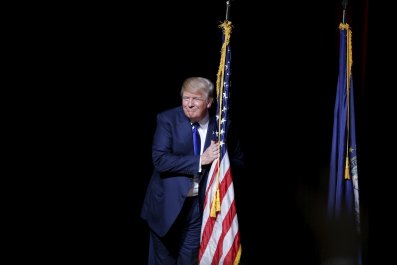Silicon Valley is the new Rome. As in the time of Caesar, the world is grappling with an advanced city-state dominating much of the planet, injecting its technologyand ethos everywhere it lands and funneling enormous wealth back home.
Peter Thiel—tech investor, avowed monopolist, proponent of skipping college—has many of us wringing our hands about Silicon Valley's swelling wealth and influence. Thiel spent about $10 million to secretly fund an ex-wrestler's lawsuit against a salacious news-gossip website, allegedly as revenge, and the revelation of that set off panic about the ability of Silicon Valley and its billionaires to impose their will.
Thiel is just one of many stories with a similar theme. Facebook got accused of muting conservative news on the site, stirring still more worries about media control and censorship. Meanwhile, Facebook CEO Mark Zuckerberg made Thiel look like a cheapskate when he paid $30 million to buy and tear down four homes around his residence, just so nobody will be able to see into his windows. Look around the U.S. and you find that Salesforce CEO Marc Benioff wielded the power to reverse an Indiana law that might have discriminated against the LGBT community, by threatening to abandon the state. The Donald Trump phenomenon has been largely fueled by voters angry that their jobs are getting reamed by technology.
Similar angst about California's peninsula of geeks and Ghirardelli has resulted in backlash around the globe. The European Commission is freaking out about Google and Netflix, China has been pushing back against Apple, and India recently stopped a Facebook plan to offer free internet because the government felt India might lose control over its wireless infrastructure. "There are certain rules necessary to operate so India doesn't become a digital colony," Sharad Sharma of Bangalore think tank iSpirt told journalists.
And yet the Silicon Valley Empire is just getting started. A new generation of technologies such as artificial intelligence, 3-D printing and blockchain—all likely to be developed primarily by Silicon Valley companies—are about to cross the chasm from prototype to mainstream and challenge everything you know about manufacturing, money, services, national sovereignty and much else in your life. If you think there's been head-spinning change since 2007, when smartphones, social networks and cloud computing combined to usher in the current tech era, the next 10 years could short-circuit your cortex.
Is all this good or bad? The answer is as complex as asking the same question about the Roman Empire two millennia ago. Nice for some; really sucks for others. With hope, beneficial to humanity in the long run, but we might have to give it a couple of hundred years to really know.
Get Used to That Sucking Sound
Silicon Valley loves to "disrupt" stuff. Well, now it is disrupting the world. Famed tech analyst Mary Meeker this month released her annual data dump about the industry. If you pick it apart, you can clearly see Silicon Valley's ascendency in the global economy.

For instance, Meeker listed the 20 most valuable tech companies in 2015. Twelve were American, seven were in China, and one was in Japan. None came out of Europe or India or anywhere else. The U.S. companies represented 76 percent of the total market cap and 87 percent of the revenue. Of the dozen companies based in the U.S., just one is not in Silicon Valley (Priceline, based in Connecticut).
Here's a different way to see the tilt toward California: The number of Internet users is growing faster in India than anywhere else in the world. Almost all of that growth is from people using mobile phones. The top three phone apps in India are owned by Facebook (Facebook, WhatsApp and Facebook Messenger), so no wonder India was worried about even more encroachment by the company. Also, almost all of India's mobile phones run on either Google's Android or Apple's iOS operating system. That means a significant proportion of India's most dynamic industry is sending money to Silicon Valley. That kind of thing is happening in every country except, like, North Korea.
In recent years, the payments going to Silicon Valley have been lurching beyond pure technology and into businesses that used to be non-digital and entirely local. Uber shows how that works. The company takes a 20 percent cut of the fare for every ride. In France, say, 100 percent of money spent on taxis used to stay in France. If Uber wins a significant chunk of France's taxi industry, 20 percent of that money will leave France. Now imagine that happening in industry after industry, country after country.

(Speaking of money cascading into Uber from abroad, an investment arm of the Saudi government just pumped $3.5 billion into the company. The Saudis apparently could not find promising tech startups in their own country to invest in.)
Alphabet, Google's parent, controls 12 percent of all money spent globally on media advertising, according to Adweek. No company has ever controlled 12 percent of global ad spending! And there's no question Google is sucking serious money out of countries. In 2015, Google got 54 percent of its $75 billion in revenue from overseas.
In the macro picture, tech is one of the few economic sectors growing in any meaningful way anywhere in the world. Meeker's stats show that global growth of gross domestic product has been below average for six of the past eight years. So if global growth is stagnant and technology is hot, that means most other segments are really crappy. Since most of the money being made in technology is by companies based in Silicon Valley, it seems that it is driving a lot of the world's economic dynamism—and most of the world is paying Silicon Valley for it.
On the campaign trail, Trump keeps saying America is losing. But he's wrong: America is clearly winning in technology, big time. The problem is that a lot of America is not Silicon Valley, which is but a short stretch from San Francisco to San Jose. Even within the United States, Silicon Valley is playing Rome, and the rest of us could wind up like Judea.
Geography Is Dynasty
We have two Americas now: Atoms America and Bits America. Atoms America is manufacturing, retail, services, restaurants—old-school business you can see and touch. And Atoms America is in trouble. In May, job growth in the U.S. was the slowest in more than five years, according to federal data. Some 10,000 manufacturing jobs disappeared. For years now, middle-class wages have stagnated. A vast swath of people are seeing their jobs automated away by software. Trump's supporters tell pollsters they feel resentful and powerless. Voting for Trump is fighting back.
On the other side of this divide is Bits America. These are people who write code, analyze data, sell apps, invest in startups. The top talent in Bits America entertain bidding wars for their services. There are pockets of Bits America all over the country and high concentrations in places such as Boston, New York, Washington, D.C., and Seattle—each home to significant tech companies. Still, nothing in the Bits universe rivals Silicon Valley—land of peach-fuzz billionaires, rocketing housing prices and highways filled with Teslas, with Stanford University operating like the region's power plant for talent.
More money gets invested in more companies there. In the first quarter of this year, California companies—almost all in Silicon Valley—got $396 million in venture funding, nearly three times more than second-place New York ($149 million) and four times more than third-place Massachusetts ($90 million). And wealth created in Silicon Valley tends to stay home. Even when companies go public, it's not making people rich across the country. Look at the top 40 owners of Facebook stock. Almost all of them live in Silicon Valley. (Thiel, No. 7, owns 2.5 percent, worth more than $2 billion.)
When smart people from all over the world want to build a technology company, they go to Silicon Valley. The Collison brothers grew up in a small village in Ireland. Clearly brilliant, Patrick Collison left Ireland to go to MIT, and John Collison attended Harvard University. In 2010, the brothers started digital payments company Stripe and in 2011 got $2 million in funding from three Silicon Valley venture investors: Sequoia Capital, Andreessen Horowitz and…Thiel. Stripe is now worth more than $5 billion. It's not based in Ireland or Boston. It's in San Francisco.
Silicon Valley's momentum is not slowing. I talk to a lot of Bay Area investors. Ten or 15 years ago, they were flying to China and India, looking for promising investments, and some set up branches around the U.S. Now the attitude of many is they don't need to go beyond a 50-mile circle around Palo Alto. Most of the talent of any consequence is there already or will go there.
For his book The New Geography of Jobs, Enrico Moretti, an economics professor at the University of California, Berkeley, crunched economic data and found that, counterintuitively in this connected age, geography matters a great deal in the tech industry. "In innovation, a company's success depends on more than just the quality of its workers—it also depends on the entire ecosystem around it," Moretti wrote. "It makes it harder to delocalize innovation than traditional manufacturing." An industry like steel or shoes can move to where labor and resources are cheaper. Tech industries need to coalesce in a few places, and Silicon Valley is the most powerful magnet of them all.
Take It All Apart
In 2015, the media ogled "unicorns"—private tech companies valued at more than $1 billion. Private valuations got a little crazy. The word bubble surfaced. Even Silicon Valley insiders predicted a comeuppance. Meeker popped all that bubble babble. "There are pockets of internet company overvaluation," she said. "But there are also pockets of undervaluation. Very few companies will win. Those that do can win big."
We describe it another way in Play Bigger, the new book I co-wrote with three Silicon Valley startup advisers. Our highly networked age has created an environment where one company tends to develop and then dominate a new category of business (as Facebook, Airbnb, VMware and many others have done) and win big over time. Silicon Valley is the best region in the world at generating these category kings, and new ones will become the most valuable companies of the next generation.
It's probable that the coming category kings will dwarf our Facebooks and Googles. Artificial intelligence is a game-changing technology, much like cloud-based apps over the past five years. It will be the basis for inventions we can hardly imagine now. (How about an AI-driven tiny drone that learns to buzz around and keep an eye on a building, replacing security guards? It's coming!) And 3-D printing will get good enough so that a company like Nike will no longer make shoes in Asia and ship them back to the U.S. Instead, it will "print" them in a network of thousands of small factories peppered throughout cities and towns—so you can pick up your ready-made sneakers locally. Blockchain—the complex technology behind bitcoin—is only beginning to remake the financial industry. Virtual reality will get good enough to reinvent stuff like tourism, sports and doctor's office visits. Biotech, robotics—an incredible array of technology is ready to burst upon us.
The impact will be so dramatic, Hemant Taneja of General Catalyst Partners tells me we're heading into a "global application rewrite." We are about to take apart every product and service in the world and put it back together with data, AI and all this other new stuff.
Sure, some of the companies that take advantage will come from places that are not Silicon Valley. Much-ballyhooed virtual reality startup Magic Leap is in Florida. Some important financial tech based on blockchain is coming from New York. But Silicon Valley hosts the majority of companies beginning to drive the global application rewrite. As Meeker said, the few that dominate new businesses will win big over time, all over the world, making it harder than ever for other places to catch up.
So let's go back to whether this is good or bad.
If you pick up your mobile phone, you'll see a lot on there that you used to pay for and now comes free or cheap. You have a camera and a flashlight, both of which you used to buy. News is free—no need to buy a newspaper. International calls are cheap on Skype. Music—free or cheap on Spotify.
That device is just one example of the impact of technology and globalization. It's increasingly making more things cheap or free, in many ways lowering our cost of living. That works on physical goods too—tech and global manufacturing are why you can buy nice clothes at H&M for way less than similar items cost 20 years ago. Technology will only accelerate this trend. Mike Maples, partner at tech investment company Floodgate, tells me we're heading into an age of abundance, when we'll have access to much more for much less than ever before. We'll live better lives on less money. Which seems quite good.
However, as Moretti's data show, that same dynamic crushes the middle class by killing jobs and shrinking salaries. If more stuff is free or cheap, fewer people can earn money making and selling things. Instead, when something gets reduced to a cloud-based app, relatively few people can make it and sell it around the planet—and rake in all the money. Consider maps. Lots of companies used to print them, and lots of stores sold them. Today, there's one consumer map company that matters globally: Google, based in Mountain View, California. Google gets all the map money, and most of those map jobs are gone.
For much of the world outside of Silicon Valley, the bad is starting to feel worse than the good. We love our phones and apps and cheap things, but we don't like feeling economically marginalized. A move like Thiel's against Gawker adds to the sense that an elite few have all the leverage. Books like Martin Ford's Rise of the Robots suggest that technology will replace most of our jobs. Trump has tapped into middle-class anxiety about the future. So has Bernie Sanders, although someone should tell him he's fighting yesterday's war—the easy capitalist villains going forward aren't going to be on Wall Street but up and down California's 101. (Sanders this month drew 4,000 to a rally in Palo Alto, where housing prices and income inequality are leaving non-millionaires behind.)
If you put all the current trends together, it seems obvious Silicon Valley will become the most powerful place on earth at the expense of just about everywhere else on earth. The one thing that might derail the Silicon Valley express would be something like the Russian Revolution, in which the workers rise up against the autocracy. That doesn't seem imminent, but it's a possibility Silicon Valley needs to embrace and counter, or at best it's going to wind up fending off escalating attacks from governments, activists and the frustrated masses. The industry's nightmare would be getting regulated like electricity and telecommunications—industries that once invented cutting-edge technologies but turned into sleepy bureaucracies under government rule.
For decades, tech's movers and shakers have focused almost solely on developing innovations and building companies. In this next chapter, they must make certain the rest of the world prospers too, or somewhere down the line Peter Thiel might find himself fiddling while things get hot all around him.


















